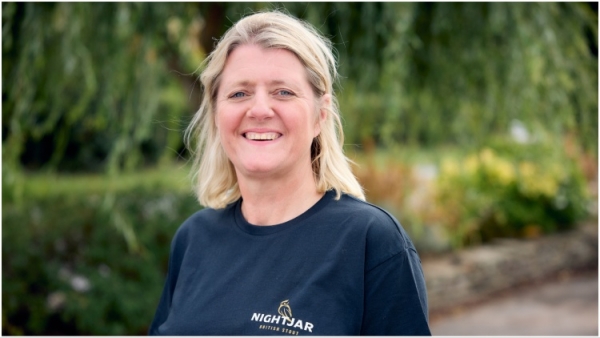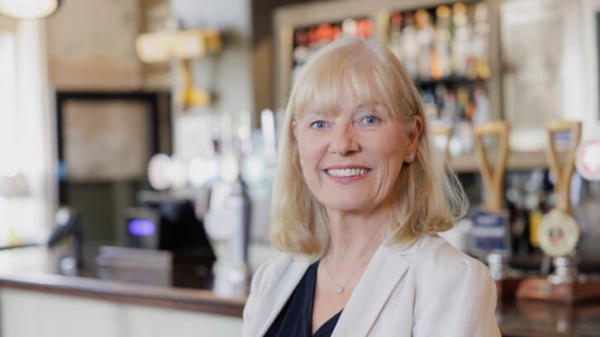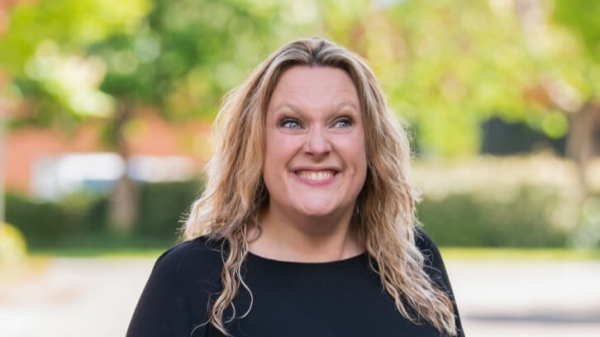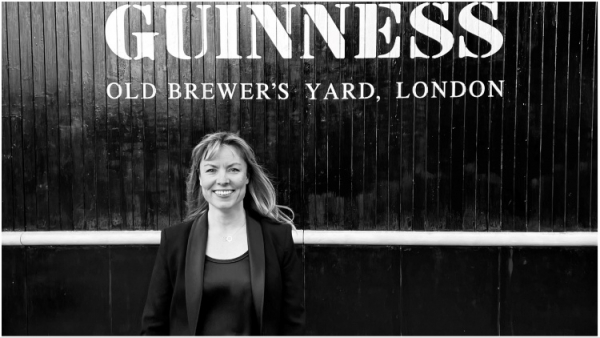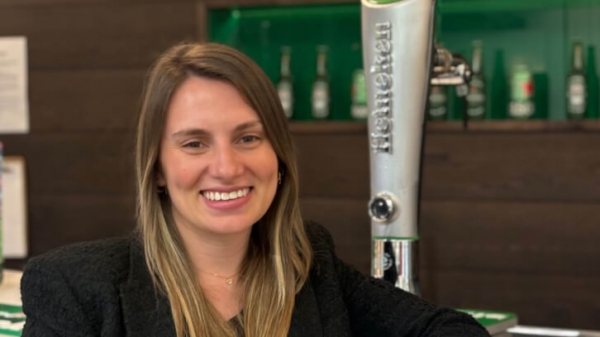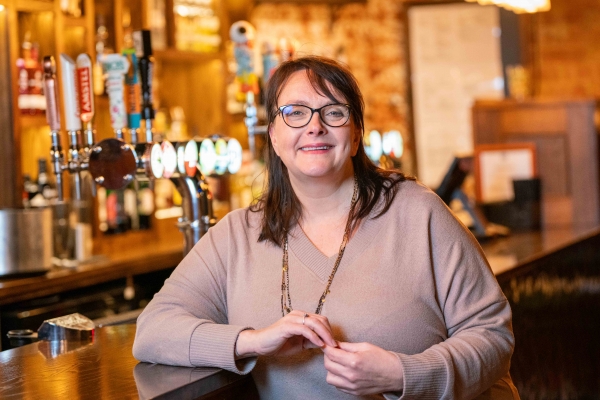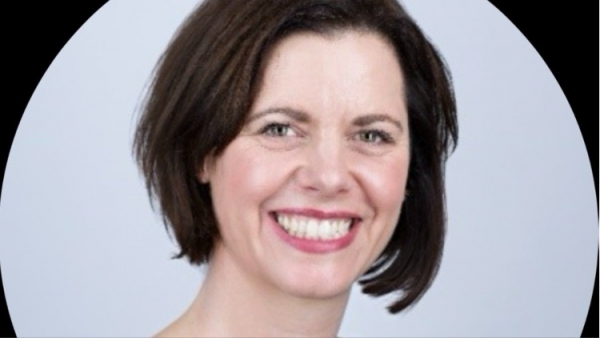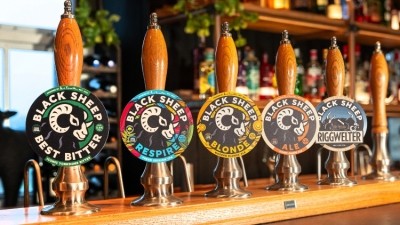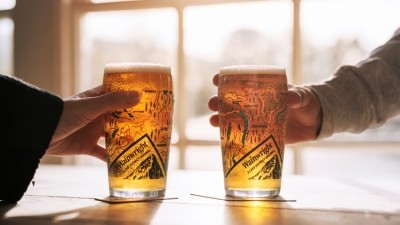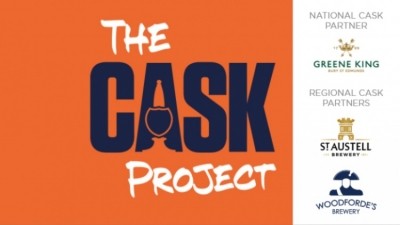INTERNATIONAL WOMEN'S DAY 2024
Head office stars show how it's done
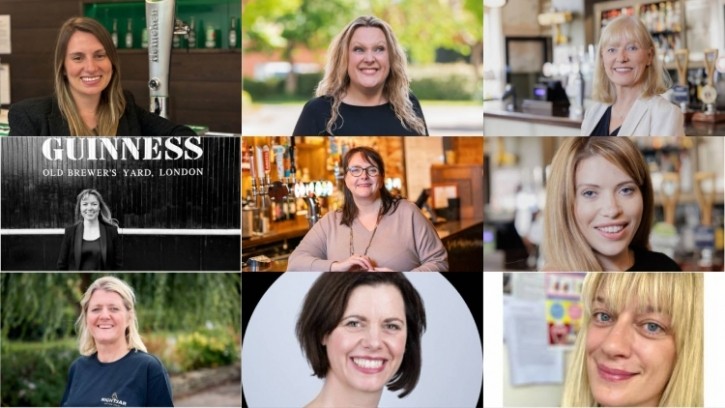
Name: Abbie Gadd
Job title: Head of Sales & Marketing
Place of work: Wye Valley Brewery
As this year’s International Women’s Day theme is #InspireInclusion, what does this mean to you?
I’m always striving to be an inspirational team leader and colleague, and while I commend the positivity that International Women’s Day promotes, it’s important that we try to inspire and include our colleagues all-year round.
I do feel fortunate to work for a family-run business that actively encourages its employees to get involved with helping to shape the future of the company and how it is run, so I see lots of opportunity for my female colleagues.
And on a personal note, the theme of ‘inspire inclusion’ is important to me, not just in my own friendships but also the friendships and professional relationships that my 17-year-old son forms with women throughout his life.
Where do you see the sector as an inclusive place to work for women?
In the past decade, we’ve seen more women in prominent roles within the brewing sector, such as brewmasters, maltsters, hops farmers, laboratory technicians and beer writers, which is exciting to see.
At Wye Valley Brewery, we’d love to see more women applying for jobs in our transport and production teams but we have female colleagues excelling in roles in quality control, finance, and sales.
What are the main barriers to preventing inclusion?
Like any industry, company culture is key to creating an open, diverse and supportive workplace, and that starts at the top.
Our senior management team is equally represented, with the head of operations, head of finance and head of sales & marketing positions all held by women. If companies are serious about being more inclusive, they need to first look at how they might be perceived by candidates applying for roles in their organisation.
How far has the sector come?
It is still a male-dominant sector but there is an increasing shift in the influence women are having on the industry and in the job roles that women are now doing. So, we are seeing more women involved with the brewing and logistics aspects of the business and not just in office-based admin roles.
What more can be done to improve?
Highlight the diverse job roles women are now doing in the sector and actively communicate the career opportunities to colleges and universities, eg, at careers open days. Also, look to support entry into the sector through work experience and apprenticeship programmes.
What advice would you give to other women in the industry?
Don’t be afraid to be passionate and creative. New ideas and approaches are what all industries need to evolve, remain innovative and thrive.
Name: Michelle Churchill
Job title: Operations Manager
Place of work: Wye Valley Brewery
As this year’s International Women’s Day theme is #InspireInclusion, what does this mean to you?
Wye Valley Brewery is a family-run business with women making up almost 20% of our workforce. Our ethos is that everyone should have a voice and with International Women’s Day approaching, hopefully it inspires all our female staff to feel they have a ‘voice’ at work and in the community.
Where do you see the sector as an inclusive place to work for women?
Wye Valley Brewery has always been an inclusive place to work for women, as demonstrated by the number of women in prominent roles – half of the senior management team is represented by women.
Also, the growing trend of female beer drinkers means that there is more of an interest in our industry, which is encouraging to see.
What are the main barriers to preventing inclusion?
The brewery has a diverse workforce across most departments but there are still some areas such as transport and production that are dominated by male staff.
The main barrier for us to improve this as a business is the lack of applications from women who want to work in these roles – it’s important for women to know we always welcome applications from anyone and offer specific on-the-job training to help people succeed in their roles.
What more can be done to improve?
More visibility of women working in the industry. Networking opportunities, education and mentorships for women in the industry would be beneficial – Women supporting women.
What advice would you give to other women in the industry?
I would say ‘go for it’. The industry itself is very supportive and you get to know people from all walks of life.
Personally, I have always found Wye Valley Brewery to be supportive of my career and have never felt differentiated against because of my gender while at work and would hope that my colleagues have had the same experience.
Name: Suzanne Baker
Job title: Non-Executive Director
Place of work: Multiple hospitality companies
As this year’s International Women’s Day theme is #InspireInclusion, what does this mean to you?
Equality and inclusion for women should not be a cause it should be a natural right, but we still have a long journey ahead of us until that becomes the norm. Within the businesses I have worked, I have looked to champion empowerment and inclusivity for women.
Engagement with powerful mentoring programmes enables inspiration, engenders confidence and demonstrates that there is a pathway for women to progress and achieve their ambitions. Recognising and rewarding all round business skills along with the softer skills often demonstrated by women generally makes for a more inclusive and empathetic environment enabling women to rise in leadership positions.
Where do you see the sector as an inclusive place to work for women?
It still has much work to do. For women, there are still a number of challenges to overcome, for example, those with young families often do have to make tough choices and sacrifices.
Many companies are adopting more inclusive and family friendly policies, such as those operational in businesses such as Stonegate Group, Greene King, M&B and the recent announcement from Molson Coors expanding its inclusivity policy enabling all parents to take equal parental leave.
This move helps ease the sharing of parental responsibility, which often falls to the woman in the early days following the addition of a new member of the family, enabling women greater flexibility to continue their career progression.
What are the main barriers to preventing inclusion?
Often it is a lack of role models, unconscious bias and attitude. As a sector we now have a number of women leaders emerging. It is great to see at the helm of two of our trade associations women are leading.
Kate Nicholls OBE has been doing a great job harnessing the power of the sector in driving reform and Emma McClarkin OBE is doing an equally fantastic job driving the brewing and hospitality agenda with the Government.
We are seeing more women on boards as employers improve their business working practices. There remains a lack of confidence amongst women to push themselves forward which often results in them being overlooked albeit they have the skills and knowledge to do the job.
How far has the sector come?
Inclusion is much more of a strategic focus nowadays, shaping policies, and now underpins the foundations of company culture and ethos across the industry. Hospitality has come a long way since I joined Grand Metropolitan on their graduate training scheme.
I have been fortunate to work with senior leaders that demonstrated inclusivity as a natural element of their management style, but it was certainly not the norm at the time. The support of those at the top is crucial in setting the agenda for inclusivity, without this I simply would not have achieved my first board position at age 33 while at JD Wetherspoon.
Equally when I joined the board of Laurel, I had a young family, so juggling work and family life was not always easy but with the support from Ian Payne MBE, who has always promoted inclusivity within business, it enabled me to continue to grow with the business which through acquisition and change became the biggest pub company in the UK.
Throughout my career I have seen the support for women improve through great mentoring programmes, bespoke initiatives, improved policies and greater encouragement from those at the top.
What more can be done to improve?
Nurture, support and empower women. Inspire the leaders of tomorrow by supporting the women entering your businesses today by building their knowledge, their skills and confidence; by listening to their ideas and thoughts, as well as understanding and nurturing their aspirations.
What advice would you give to other women in the industry?
Believe in yourself. Build a network around you. Set your goals and don’t be distracted in your ambition to achieve them. Help nurture those around you as you progress your career, you too can help inspire other women to develop and grow.
Name: Molly Davis
Job title: Head of Communications
Place of work: British Institute of Innkeeping (BII)
As this year’s International Women’s Day theme is #InspireInclusion, what does this mean to you?
Inclusion should be about making work a brilliant space for everyone. For me that starts with being kind, friendly, approachable and understanding.
You can have different opinions, ways of working, comfort zones etc. but if you start with the right mindset, then it becomes much easier to make adjustments that work for everyone.
Where do you see the sector as an inclusive place to work for women?
I think we have come a long way, but we still have a long way to go, in our industry and as a society in general.
Inclusivity 10 years ago meant accepting women might be coming into roles that have previously been male dominated, and vice versa – moving that onto a place where that isn’t even questioned will always be the challenge. We see some phenomenal operators at the BII, but there are still relatively few single operators or business partnerships who are female, particularly owning their own businesses.
Having said that, we had a fantastic mix of people within our group of finalists in LOYA last year, with Michelle Gilmour as a brilliant female operator who has since gone on to take a second pub.
What are the main barriers to preventing inclusion?
Life-work balance will always be an issue until we make it easier for everyone to be treated with kindness and understanding.
Some of our most successful members run their business with their life partners, which allows them to care for their families as a team (as it should be!) and have a great business.
If you are not in an autonomous role alongside your partner though, managing a career in any sector is really tough if you are the one with the main responsibility for things in your life outside of work.
Still in the vast majority of cases, childcare and emotional labour (birthday cards, presents, caring for relatives, school runs, medical appointments – the list of life admin goes on and on!) overwhelmingly falls to women.
How far has the sector come?
I’ve only been in this industry for seven years, and I have seen a shift in inclusivity in lots of areas, but if I am honest, there is still so far to go.
We don’t openly tolerate outdated and hurtful attitudes towards people’s gender, sexual orientation, race, religion and more, but truthfully, unless we are actively accepting people for who they are and the value they can bring, regardless of any of those factors, we won’t see change.
My 18-year-old son recently got his first tattoo, and even in the last 10 years, attitudes to accepting that as “not a big deal” for getting a job in any sector, have shifted seismically. It would be great to see some of that change applied to every area of inclusivity, but the fact remains that if we don’t level the playing field as much as we can in terms of opportunities for everyone, we won’t see that happen.
What more can be done to improve?
Parental policies would be a great place to start. Enabling people to split their parental leave, either so both parents can be at home together in the early months, or take time individually. Not everyone will want that, but unless we make it an option, nobody will be able to take advantage of it, and more importantly, other people won’t see the potential benefits for their home lives and their careers.
As workplaces, until we lead on delivering real change and understanding that everyone has a life outside of work that they need and want to contribute to. It should be more about recognising the importance of flexibility for everyone, not just women, so they can take their kids to the dentist, or finish work on time instead of burning the midnight oil. I think there are so many men in our industry who feel the pressure to have to work ridiculous hours, which in turn puts pressure on families. The scary thing for me is the amount of women who are vital to companies, brilliant at their jobs, and are holding all of that together, whilst still taking on the roles at home that 50 years ago would be a main occupation – and a busy one at that!
What advice would you give to other women in the industry?
A big one for me is valuing different traits in female leaders as a positive thing. There is so much data that points to the fact that some more traditionally female approaches to teamwork, leadership, collaboration and more, are hugely valuable in companies. Again, kindness and understanding that everyone brings something different to the table is a strength, not a weakness – does that approach mean you are not commercial? No. Does it mean you can’t make tough decisions? No.
If you are great at your job, believe it and fight to get that recognised on your own terms – don’t try to mould yourself into something you’re not. I have worked for, and with, some truly awful people and some truly brilliant people in my career, and the one common thread is not what they are, it’s who they are. Kind, empathetic, good humoured and understanding.
Name: Anna Macdonald
Job title: Category Marketing Director – Beer
Place of work: Diageo GB
As this year’s International Women’s Day theme is #InspireInclusion, what does this mean to you?
My role as a leader is to walk the talk – to inspire, but also educate and enable change in the organisation and the wider industry.
That means being brave and directly tackling things that still require work, as well as celebrating progress and pioneering work.
Remembering where we have come from is really important because we’ve achieved a lot, especially in this country, but there is still work to do.
At Diageo, we want to help create a world where everyone can be themselves. We believe there is power in diversity and when diverse groups work together, greater success can be achieved. Our ambition is clear: we must create the most inclusive and diverse culture that ensures all our people thrive.
Where do you see the sector as an inclusive place to work for women?
Having worked at Diageo since 2000, it has been fantastic to see the progress that has been made in the business so far. Of course, there is more to do, but Diageo is a company that is always looking at how to improve. Not only as it helps the business grow, but also because it is the right thing to do.
When it comes to our senior leadership team, for example, we are really proud of the steps we have taken so far. Not only is 73% of our board female but representation of women in our leadership, including our executive committee, remains strong at 44% (June 2023). We are not resting on our laurels though and we have stretching ambitions for our leadership group to be 50% female by 2030.
We have also taken great steps to make different categories within the drinks sector even more inclusive. For example, whisky was previously considered a predominantly male industry, however, we champion the women that work for our whisky brands.
We also appointed our first female Johnnie Walker Master Blender, Emma Walker, in 2021 and I am confident women will continue to play a critical role in shaping the success of our whisky brands in the future.
Also, when it comes to Guinness, we have seen a 24% rise in the number of women drinking Guinness in Great Britain which is great to see.
We are always doing work as part of our partnership with The Six Nations, which includes sponsorship of both the Men’s and Women’s Six Nations, to ensure that rugby (and Guinness) become even more inclusive and something for everyone to enjoy.
What are the main barriers to preventing inclusion?
There are many factors to consider in order to remove barriers preventing inclusion.
At Diageo, we have been looking at ways we can make changes to our recruitment strategies to ensure it is more inclusive.
Simple things such as offering training at times of day that don’t clash with household responsibilities and providing new ‘on demand’ formats that are easy to access are just a few ways to overcome barriers.
We run our Learning for Life programme that aims to provide people with business and hospitality skills to help them have a successful career in the industry.
In our previous financial year, out of the 31,600 people reached as part of the programme, 59% of them were women.
We have taken a number of steps to ensure we break down any barriers there may be in accessing this resource. Now, we have measures in place to ensure women’s needs are met at all stages of design, implementation, and evaluation.
We have also launched a range of initiatives to support women who are employed with Diageo to ensure we continue to champion inclusion and diversity across our entire business.
We are transparent regarding our gender pay gap, have introduced an industry-leading Family Leave policy, launched Fertility Support Guidelines in the UK market, as well as Menopause Guidelines globally, which offers strengthened support and flexibility to employees going through menopause in over 40 countries across all regions.
How far has the sector come?
The sector has come a long way, however, we know there is still a lot of work to be done. I truly believe when diverse groups work together, greater success can be achieved, and we need to keep working and adapting to make these positive changes.
What more can be done to improve?
As mentioned, Diageo are constantly looking to learn and improve. To shape a more diverse and successful long-term business and society we’ve set bold goals as part of our Society 2030: Spirit of Progress ESG action plan, which include having 50% representation of women in leadership roles by 2030 and ensuring at least 50% of people trained by our community programmes are women.
What advice would you give to other women in the industry?
Be yourself. Be brave and have clear boundaries.
Name: Giulia Damante
Job title: Head of People – Star Pubs and Support Functions
Place of work: Heineken UK
As this year’s International Women’s Day theme is #InspireInclusion, what does this mean to you?
#InspireIncusion is about how you demonstrate the spirit of inclusion in your work, community, and among your network.
Inclusive behaviours, no matter how big or small, create awareness and impact, and ultimately normalise an inclusive mindset for others – we are more impactful when we take bold moves that inspire others. Above all, set an example of what good looks like – a rising tide lifts all boats, after all.
Where do you see the sector as an inclusive place to work for women?
Progressive employers have prioritised and implemented lifestyle-friendly shift patterns, better working hours (moving away from the previous industry standard of 45+ hour contracts), more inclusive dress standards/uniforms (sizing, fit, appearance), and compelling women-friendly policies and practices (such as enhanced maternity leave).
They’ve also focused on representation in hospitality leadership roles through capability building in early careers and middle management.
What are the main barriers to preventing inclusion?
The main barrier to inclusion in hospitality is when we hold too tightly to traditional practices and mindsets thinking their success in the past still holds relevance in a contemporary operation, when they don’t.
Working long days may have been the norm previously, but they aren’t welcomed today; and being on rota every weekend perhaps was expected in the past but may be less attractive now as our lifestyle needs and choices have evolved.
Further, while retention is important, when we over-glorify and reward tenure we are doing ourselves a disservice in being able to welcome and nurture new entrants to the industry, including women. Creative shift options, pay practices, and better inclusive work policies and practices will help us establish better belonging for women in the industry and make persuasive inroads.
How far has the sector come?
We’re in a period of compelling transition, and we’ve come a long way – the more our industry champions inclusion and modernises our workplace practices, the better the position we’re in to support the sustainability of the hospitality industry.
Those that choose not to will eventually understand why it was so important to have started a long time ago. But there’s still time! We can, and must, do better. Our workforces and leadership roles need to better represent the consumer base we’re in service of, and it starts by who we employ and the positions we employ them in.
What more can be done to improve?
In our industry, we often focus on design to maximise the consumer experience, our spaces, after all, are for communities and the public. But what about the employee experience? Our local pub is also someone’s workspace, and it needs to reflect the diverse needs of employees.
Ensuring, for example, there is back-of-house space that is safe, private, and accessible will enhance the people experience and will go far in attracting more women to the industry.
What advice would you give to other women in the industry?
Go easy on the negative self-talk ladies, we can be our own worst enemies sometimes.
Show-up for other women in the industry by believing in yourself and leveraging a growth mindset – I’m inspired by the exceptional capabilities, and often bandwidth, of all women and a greater representation in the industry will only enable greater things.
Name: Helen Fingland
Job title: regional operations director
Place of work: Star Pubs & Bars
As this year’s International Women’s Day theme is #InspireInclusion, what does this mean to you?
It’s a great opportunity to underpin Star Pubs’ focus on having a culture that truly recognises the strength of individuality – and the varied thinking and vision that women bring to our teams.
It also makes me proud to be part of an organisation that has stepped up and worked hard to ensure inclusion and diversity are a priority when it comes to recruitment.
Where do you see the sector as an inclusive place to work for women?
The whole pub trade is an increasingly inclusive place to work. That’s due both to the industry recognising a need to change and to the women who have fought hard in all parts of our sector to succeed in what was, for many years, a lonely place for women.
What are the main barriers to preventing inclusion?
We need to continue to drive the message that pubs and pub companies are inclusive places to work in order to break down any outdated perceptions that roles are still geared towards men.
In all areas of the pub industry, our jobs are challenging – as are many outside this sector – but they’re also very rewarding and flexible. The opportunity to work with great teams and bring fantastic pub businesses to life gives real job satisfaction.
How far has the sector come?
It’s come a long way since I started out more than 30 years ago. As I progressed, whatever company I was employed by and whatever job I was in, I was often the only woman working in that role. That didn’t stop me from pushing hard to move into different positions or let the knock-backs make me give up.
It was challenging – but that’s probably shaped the character I am today! What I see now is a huge leap in the number of women taking better and better roles in what was previously a male-dominated industry. I also see everyone working hard to attract more women as well as increasing numbers of women at interview; remembering it is key that the right person gets the job!
What more can be done to improve?
We need to highlight the strides the industry is making and promote its many fantastic female role models. This is a great industry to work in; there’s endless scope for women to have enjoyable, successful jobs in a huge variety of roles – from brewing to brands. We should shout about that.
What advice would you give to other women in the industry?
Stick to your principles and continue to push the boundaries. Ensure anyone you encounter who isn’t on board with inclusivity feels uncomfortable.
Name: Melissa Wisdom
Job title: Chief Commercial Officer
Place of work: Stonegate
As this year’s International Women’s Day theme is #InspireInclusion, what does this mean to you?
To me, #InspireInclusion is about inspiring others to truly understand the ‘why’ and the importance of inclusion.
Not only is it simply the ‘right thing to do’, it adds value to society and commerce alike.
#Inspire inclusion emphasises belonging and empowerment. It means fostering an environment and support system that both encourages and enables everyone to pursue their passions and goals.
I know I am privileged to have grown up with strong female role models and to also have had strong mentors in my career who have helped me strive to achieve my potential. This is not the same for everyone. It inspires me that every single one of us has the potential to make a huge impact on others if we choose to.
Where do you see the sector as an inclusive place to work for women? How far has the sector come?
Our sector has a hugely diverse range of career pathways and welcomes all with accessible routes into the industry.
We have some amazing role models in our sector and people can increasingly see ‘people like me’ in leadership positions more often.
We are not there yet though; we have much more to do to ensure leadership positions reflect both the sectors workforce composition but also reflect our consumers and guests.
What are the main barriers to preventing inclusion?
Unconscious bias is statistically one of the main barriers to inclusion in society and industry alike, recognising this and building awareness through conversation and training is fundamental.
What more can be done to improve?
We need to continue to go further on fostering an environment and support system that encourages and enables women in particular to pursue their passions and goals to demonstrate it can be achieved. Ultimately this needs to become a consistent culture vs campaigns or a moment in time.
We work in a sector that has been connecting people, with communities at its core, where everyone is welcome, we also have accessible career entry points. There is a strong argument we have the context to be a leading sector in inclusion.
I am proud to work for a business that has a genuine bar to boardroom culture and continuously invests in the development of its people, recognising they are the heartbeat and future of the business.
As well as our award-winning career pathway, Stonegate offers a diverse range of development programmes, providing every colleague the opportunity to pursue their career ambitions.
Our female mentoring scheme continues to be really successful for us and is a great example of Stonegate’s mission to bring people together through their passion for great pubs and bars.
The scheme encourages colleagues across the business to connect and support one another to achieve their true potential and is something I personally learn a lot from as a leader. I would encourage everyone to take part in mentoring, be that as a mentor or a mentee.
What advice would you give to other women in the industry?
A few pieces of advice that have really helped me in my career would be;
First, be your authentic self in all aspects of your life, be that as a colleague at work, a partner, a mother, a friend. I speak to so many people in the industry (particularly females) who still feel they need to emulate certain characteristics in the workplace. There is only one you and your uniqueness is what makes you brilliant.
Secondly, in our industry, which rarely sleeps, you have to find a balance that works for you. Some of the best words of advice given to me were ‘there is no such thing as work life balance, only balance’.
Finally, as a leader one of my mantras is ‘in the future people will often forget what you said but they will always remember how you made them feel’.
Name: Serena Smith
Job title: Head of Category – On Trade
Place of work: Heineken UK
As this year’s International Women’s Day theme is #InspireInclusion, what does this mean to you?
Inspiring inclusion is more than just a celebration of women's accomplishments; it's about ensuring that every woman, regardless of her background, feels acknowledged and respected.
The alcohol industry is typically seen as a male-dominated field, and so for me, focussing on inclusion is of paramount importance. It's a reminder that I'm not alone in facing challenges; there are other women out there encountering similar obstacles, and collectively, we're championing each other within the industry.
However, there are still areas where we need to shift the conversation. For instance, why is it that women often face scrutiny for their beverage choices at events, be that soft drinks, wine or beer? Men don’t typically face the same interrogation about their drink preferences. While this may not be overtly offensive, it’s certainly not inclusive.
Where do you see the sector as an inclusive place to work for women?
Companies like Heineken UK and others have really opened their doors wide by offering flexible work setups that cater to all employee’s different needs, whether it's family commitments or dealing with things like menopause or shared parental leave.
There are an increasing number of role models out there now showing us that progress is happening. For example, just look at Heineken UK’s on trade leadership team – they've got an equal mix of men and women leading the charge.
But there's still room to grow. We could do more to boost opportunities for women to climb the career ladder, we still need to see more mentoring, networking, and training programs industry wide.
Overall, we're moving in the right direction, but there's still work to be done to make sure women feel empowered and included in workplaces.
What are the main barriers to preventing inclusion?
The main barriers to inclusion often come down to outdated thinking and unconscious biases that create invisible walls for women.
These barriers show up in all sorts of ways, from subtle stereotypes to full on discrimination, making it tough for women to access the same opportunities.
Breaking through these barriers means calling out those outdated biases, spreading the word about diversity and inclusion, and actively making sure our policies and practices are fair for everyone. We're making progress, but we've got to keep pushing forward.
How far has the sector come?
In my experience, the sector is moving in the right direction and picking up speed. But to truly overcome these barriers, it's going to take a team effort. We need to keep challenging stereotypes, breaking down those invisible barriers, and pushing for change. It's not always easy, but with everyone pitching in, we can keep moving forward and create a more inclusive environment for everyone.
What more can be done to improve?
We need to keep pushing for open conversations where everyone feels comfortable sharing their experiences and ideas without fear of judgment.
Until full inclusivity becomes the norm, it's crucial to actively seek out and amplify the voices of women. This involves creating opportunities for their perspectives to be heard and valued.
Education, policies, and practices that promote fairness and equality are essential. It's important to start educating people on what inclusion is from grassroots level, and then ensure that senior leaders are on board.
Heineken’s ‘speak out’ practice is great for addressing diversity and inclusion issues. However, there's always room for improvement in supporting individuals and further raising awareness.
What advice would you give to other women in the industry?
Embrace your uniqueness and don't be afraid to challenge the status quo – it's all about breaking free from stereotypes and celebrating women for who they are, not what society expects them to be. So, my advice is to be bold, be confident, and don't let anyone dim your shine.
Surround yourself with supportive allies, keep pushing boundaries, and most importantly, stay true to yourself.

